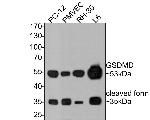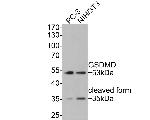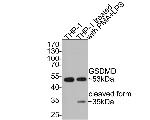Search Thermo Fisher Scientific
FIGURE: 1 / 3
GSDMD Antibody (MA5-50686) in WB



Product Details
MA5-50686
Species Reactivity
Host/Isotype
Expression System
Class
Type
Clone
Immunogen
Conjugate
Form
Concentration
Purification
Storage buffer
Contains
Storage conditions
Shipping conditions
RRID
Product Specific Information
Positive control: PC-3 cell lysate, NIH/3T3 cell lysate, THP-1 cell lysate, THP-1 cell lysate treated with PMA for 17.5 hours and then treated with LPS for 6 hours, PC-12 cell lysate, PMVEC cell lysate, RH-35 cell lysate, L6 cell lysate.
Predicted band size: 53/30 kDa
Subcellular Location: Cell membrane, Secreted.
Target Information
GSDMD (gasdermin-D) promotes pyroptosis in response to microbial infection and danger signals. It is produced by the cleavage of gasdermin-D by inflammatory caspases CASP1 or CASP4 in response to canonical, as well as, non-canonical (such as cytosolic LPS) inflammasome activators. After cleavage, GSDMD moves to the plasma membrane where it strongly binds to inner leaflet lipids including phosphatidylinositol 4-phosphate, phosphatidylinositol (4,5)-biphosphate, phosphatidylinositol (3,4,5)-biphosphate, phosphatidic acid, and phosphatidylserine. GSDMD also exhibits bactericidal activity.
For Research Use Only. Not for use in diagnostic procedures. Not for resale without express authorization.
References (0)
Bioinformatics
Protein Aliases: gasdermin domain containing 1; Gasdermin domain-containing protein 1; Gasdermin-D
Gene Aliases: 1810036L03Rik; AW558049; DF5L; DFNA5L; FKSG10; GSDMD; GSDMDC1; M2-4
UniProt ID: (Human) P57764, (Mouse) Q9D8T2
Entrez Gene ID: (Human) 79792, (Rat) 315084, (Mouse) 69146

Performance Guarantee
If an Invitrogen™ antibody doesn't perform as described on our website or datasheet,we'll replace the product at no cost to you, or provide you with a credit for a future purchase.*
Learn more
We're here to help
Get expert recommendations for common problems or connect directly with an on staff expert for technical assistance related to applications, equipment and general product use.
Contact tech support
